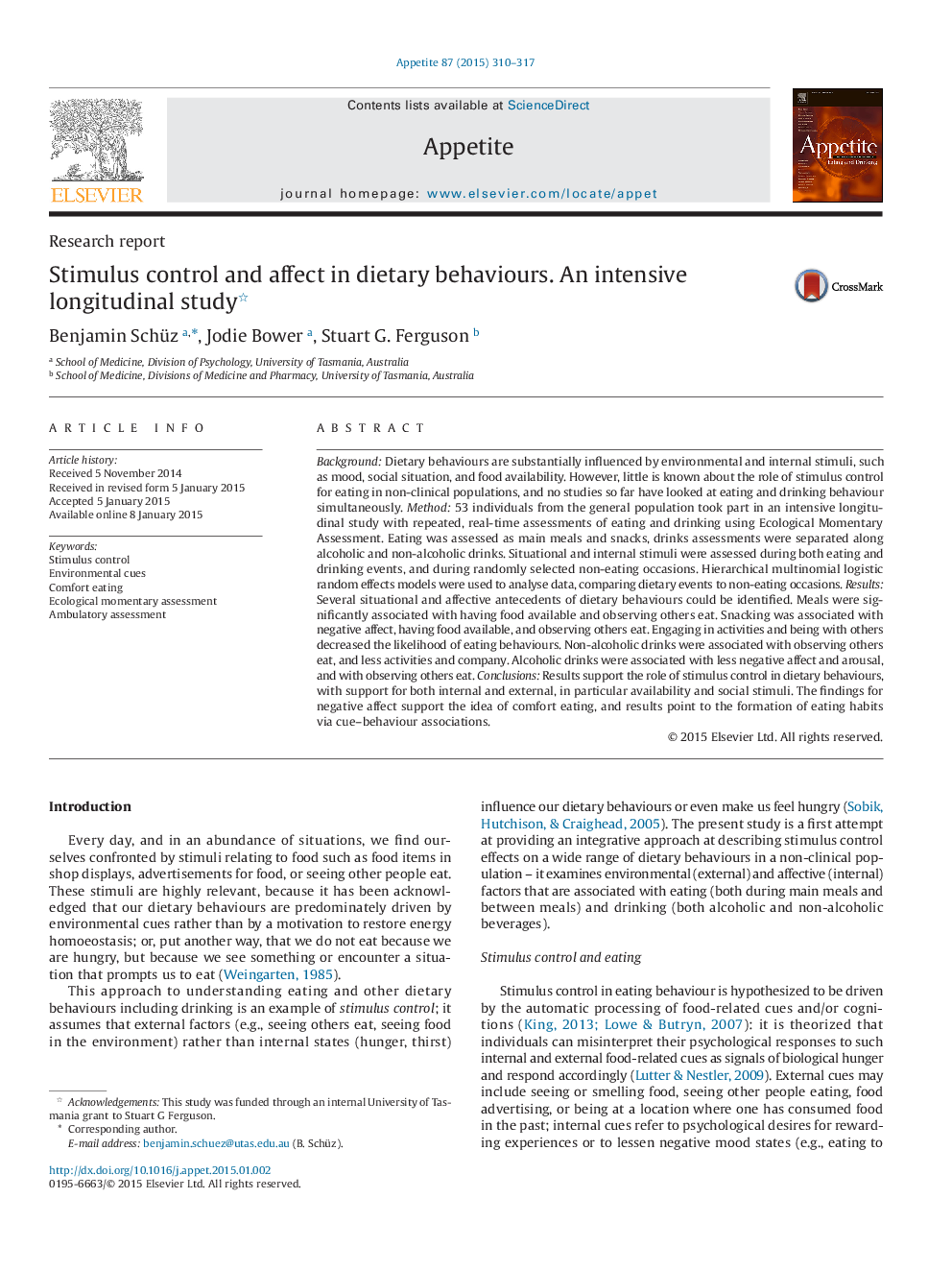| کد مقاله | کد نشریه | سال انتشار | مقاله انگلیسی | نسخه تمام متن |
|---|---|---|---|---|
| 7309503 | 1475393 | 2015 | 8 صفحه PDF | دانلود رایگان |
عنوان انگلیسی مقاله ISI
Stimulus control and affect in dietary behaviours. An intensive longitudinal study
ترجمه فارسی عنوان
کنترل محرک و تاثیر آن در رفتارهای رژیم غذایی. یک مطالعه طولی فشرده
دانلود مقاله + سفارش ترجمه
دانلود مقاله ISI انگلیسی
رایگان برای ایرانیان
کلمات کلیدی
کنترل محرک، نشانه های محیطی، خوردن راحت، ارزیابی لحظه ای اکولوژیکی، ارزیابی آماری،
ترجمه چکیده
سابقه و هدف: رفتارهای غذایی به طور قابل ملاحظهای تحت تأثیر محرکهای محیطی و داخلی قرار میگیرد، مانند حالت روحی، وضعیت اجتماعی و دسترسی به مواد غذایی. با این حال، کمی در مورد نقش کنترل محرک برای خوردن در جمعیت غیر بالینی شناخته شده است، و هیچ مطالعه تا کنون به طور همزمان به خوردن و نوشیدن رفتار شده است. روش: 53 فرد از جمعیت عمومی در مطالعه طولی فشرده با ارزیابی مکرر و در زمان واقعی مصرف و نوشیدن با استفاده از ارزیابی شبیه ساز محیط زیست شرکت کردند. خوردن غذا به عنوان وعده های غذایی و تنقلات ارزیابی شد، ارزیابی نوشیدنی ها در طول نوشیدنی های الکلی و غیر الکلی جدا شد. محرک های وضعیتی و درونی در هر دو حین خوردن و نوشیدن و در حین غذا خوردن به صورت تصادفی انتخاب شده اند. مدل های اثرات تصادفی لجستیک چندجملهای سلسله مراتبی برای تجزیه و تحلیل داده ها، مقایسه رژیم غذایی با موارد غیر غذایی انجام شد. یافته ها: پیشینه های مختلف وضعیتی و عاطفی رفتارهای رژیم غذایی را می توان شناسایی کرد. غذا به طور قابل ملاحظهای با داشتن غذا در دسترس و رعایت سایر غذاها ارتباط دارد. اسنکینگ با تأثیر منفی همراه بود، داشتن غذا در دسترس و مشاهده دیگران خوردن. مشارکت در فعالیت ها و وجود با دیگران موجب کاهش رفتارهای خوردن می شود. نوشیدنی های غیر الکلی با مشاهده سایر افراد غذا خوردن، و فعالیت های کمتر و شرکت نیز مرتبط بودند. نوشیدنی های الکلی با تاثیر منفی و تحریک پذیری همراه بوده و با مشاهده سایر غذاها خوردن. نتیجه گیری: نتایج حمایت از نقش کنترل محرک در رفتارهای رژیم، با حمایت از درون و بیرون، به ویژه در دسترس بودن و محرک های اجتماعی. یافته های تأثیر منفی از ایده راحتی خوردن حمایت می کنند و نتایج نشان می دهد که عادات غذا خوردن با استفاده از انجمن های رفتاری نشانه ای است.
موضوعات مرتبط
علوم زیستی و بیوفناوری
علوم کشاورزی و بیولوژیک
دانش تغذیه
چکیده انگلیسی
Background: Dietary behaviours are substantially influenced by environmental and internal stimuli, such as mood, social situation, and food availability. However, little is known about the role of stimulus control for eating in non-clinical populations, and no studies so far have looked at eating and drinking behaviour simultaneously. Method: 53 individuals from the general population took part in an intensive longitudinal study with repeated, real-time assessments of eating and drinking using Ecological Momentary Assessment. Eating was assessed as main meals and snacks, drinks assessments were separated along alcoholic and non-alcoholic drinks. Situational and internal stimuli were assessed during both eating and drinking events, and during randomly selected non-eating occasions. Hierarchical multinomial logistic random effects models were used to analyse data, comparing dietary events to non-eating occasions. Results: Several situational and affective antecedents of dietary behaviours could be identified. Meals were significantly associated with having food available and observing others eat. Snacking was associated with negative affect, having food available, and observing others eat. Engaging in activities and being with others decreased the likelihood of eating behaviours. Non-alcoholic drinks were associated with observing others eat, and less activities and company. Alcoholic drinks were associated with less negative affect and arousal, and with observing others eat. Conclusions: Results support the role of stimulus control in dietary behaviours, with support for both internal and external, in particular availability and social stimuli. The findings for negative affect support the idea of comfort eating, and results point to the formation of eating habits via cue-behaviour associations.
ناشر
Database: Elsevier - ScienceDirect (ساینس دایرکت)
Journal: Appetite - Volume 87, 1 April 2015, Pages 310-317
Journal: Appetite - Volume 87, 1 April 2015, Pages 310-317
نویسندگان
Benjamin Schüz, Jodie Bower, Stuart G. Ferguson,
